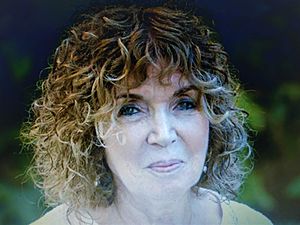Michal Schwartz facts for kids
Quick facts for kids
Michal Schwartz
|
|
|---|---|
| מיכל שוורץ | |
 |
|
| Born | 1 January 1950 Tel Aviv, Israel
|
| Nationality | Israeli |
| Scientific career | |
| Fields | Neuroimmunology |
| Institutions | Weizmann Institute of Science |
| Doctoral students |
|
Michal Schwartz (born January 1, 1950) is a leading professor in a field called neuroimmunology. She works at the Weizmann Institute of Science in Israel. Her research focuses on how our body's defense system, the immune system, can help protect and heal the brain.
Professor Schwartz studies serious brain diseases like Alzheimer's disease and dementia. She has shown that the immune system is very important for keeping a healthy brain working well. It also helps the brain recover from injuries or illnesses.
She came up with the idea of "protective autoimmunity". This means that sometimes, the immune system can actually protect the body, instead of attacking it by mistake. She also found out how special immune cells help repair the brain and grow new brain cells. In 2023, she received the honorary Israel Prize for Life Sciences, a very important award.
Contents
Learning and Early Career
Michal Schwartz started her science journey by earning a Bachelor of Science degree in chemistry in 1972. She studied at the Hebrew University of Jerusalem. Later, in 1977, she earned her Ph.D. in immunology from the Weizmann Institute of Science. This is where she has spent most of her career.
She also spent some time researching nerve repair at the University of Michigan in the United States. Her early work helped set the stage for her important discoveries about the brain and immune system.
Brain and Immune System Research
At the Weizmann Institute, Professor Schwartz became a full professor in 1998. In 2016, she was given a special title, the Maurice and Ilse Katz Professorial Chair in Neuroimmunology. Her work in neuroimmunology looks at many brain problems. These include brain injuries, diseases that damage brain cells, mental health issues, and how the brain changes as we get older.
She showed that certain immune cells, like macrophages and T cells, are important for repairing the spinal cord. She also found specific areas in the brain where the brain and immune system "talk" to each other. This communication is key for immune cells to reach the brain and keep it healthy. If this communication breaks down, it can lead to brain aging and diseases. Her research also explored how immune problems in a mother during pregnancy might affect a baby's brain development.
Immune Cells and Brain Repair
Professor Schwartz's team found that certain immune cells, called bone marrow-derived macrophages, are needed for the brain and spinal cord to repair themselves. These cells are different from other immune cells already living in the brain. They play a special role in calming down brain inflammation.
Protective Autoimmunity
Her research showed that to heal from brain injuries, the brain needs help from the immune system. Specifically, it needs T cells that recognize brain parts. She called this "protective autoimmunity". This is different from autoimmune diseases, where the immune system attacks the body by mistake. Over time, it became clear that this helpful immune response brings in other important immune cells to the brain.
Keeping the Brain Healthy
Professor Schwartz's team discovered that immune cells, especially T cells, help keep the healthy brain working well. They support the growth of new brain cells throughout life. They also help the brain adapt and learn new things. These findings showed how closely the brain and immune system are connected.
The Choroid Plexus
Her team identified a special part of the brain called the choroid plexus (CP). This area acts like a gateway between the brain and the immune system. It holds immune cells and lets them enter the brain. Her group found that a signal called IFN-γ helps control this gateway. They also showed that in older brains or brains with diseases like Alzheimer's, this gateway doesn't work as well. This is due to signals from both the brain and the aging immune system.
New Treatments for Brain Diseases
Because the immune system is so important for brain health and repair, Professor Schwartz suggested a new way to treat diseases like Alzheimer's disease. She proposed strengthening the immune system using a type of treatment called immunotherapy. This involves gently blocking a pathway called PD1/PD-L1.
This treatment helps the immune system send helpful cells, like macrophages and regulatory T cells, to the brain. These cells can clear away harmful substances and reduce inflammation in the diseased brain. This offers a way to treat many problems that happen in Alzheimer's. Her ideas for this immunotherapy are being developed by a company. They are preparing for a clinical trial to test this treatment in people with Alzheimer's disease.
Mentoring Future Scientists
Professor Schwartz has guided many students in their scientific careers. She has mentored about 40 students who earned their Ph.D. degrees and around 39 students who earned their Master's degrees. Some of her former Ph.D. students include Jonathan Kipnis, Noga Ron Harel, Jasmin Fisher, and Asya Rolls. They are now making their own contributions to science.

